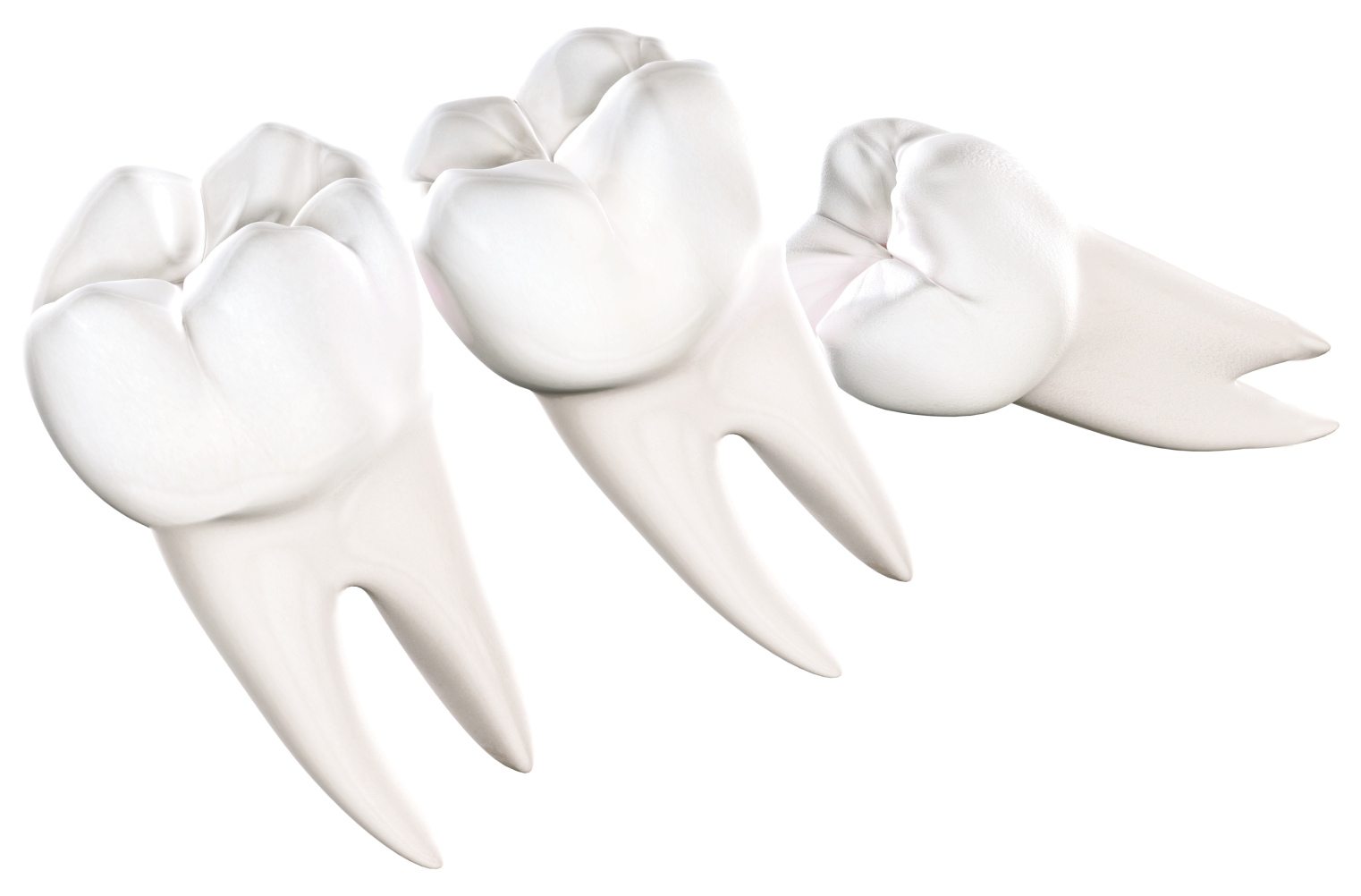Comfortable Third Molar Extractions For All Ages
The last adult teeth to develop are called third molars. More commonly known as wisdom teeth, these molars develop between the ages of 17 and 21 and often require extraction because there is not enough room for them in the mouth. If left untreated, wisdom teeth can lead to a number of oral health conditions that can cause pain and/or damage teeth and gums.Dr. Robert Lucas, Dr. Garrett Seghi, and Dr. Eric Murnan extract wisdom teeth for teens and adults at our office in Mason, OH. At Oral Surgery & Dental Implant Specialists of Cincinnati, all of our oral and maxillofacial surgeons are board-certified and hold dental and medical degrees. We create custom treatment plans for every patient and offer many anesthesia options for any type of oral and maxillofacial surgery. Contact our office in Mason, OH, if it's time for you or your child to have wisdom teeth removed.
Why Is Wisdom Teeth Removal Necessary?
The average adult mouth does not have enough room for an extra set of molars, which is why dentists and oral surgeons recommend having these teeth removed. Some wisdom teeth grow horizontally or at odd angles and become impacted, or trapped beneath the gums. A wisdom tooth may be partially or fully impacted, and impacted wisdom teeth must be surgically removed, as they cannot erupt on their own. If wisdom teeth are left untreated, a number of oral health problems can arise, such as:
- Damage to other teeth and their roots
- Inflamed gums
- Oral infection or gum disease
- Dental crowding
- Pain, swelling, or pressure in the back of the mouth
Your dentist will refer you to an oral surgeon when wisdom teeth begin to develop. It's important to attend regular dental checkups so you can have your wisdom teeth detected and extracted early.
When to Have Wisdom Teeth Removed
The right age to have wisdom teeth removed varies for everyone, but we generally recommend having them extracted during the late teens or early twenties. Wisdom teeth are easier to extract before they have fully developed, and younger patients recover faster than older patients. However, adults of any age can undergo wisdom teeth removal. Patients in their 30s and beyond can benefit from having wisdom teeth removed because this procedure will still prevent future issues from occurring.
There are rare cases where wisdom teeth removal may not be necessary. If a wisdom tooth has enough room to erupt and function without poorly affecting your oral health, we may recommend leaving it in. However, these cases are rare. Most patients will require wisdom teeth removal, whether you have only one wisdom tooth or all four of them.
Wisdom Tooth Removal Surgery
During the consultation, we will take 3D scans of your mouth to assess the third molars. If extraction is necessary, we will help you select the right type of anesthesia for your comfort. We will also provide you with pre-operative instructions to prepare you for your procedure.
On the day of your surgery, we will administer the anesthesia and wait for it to take effect. Your oral surgeon will extract erupted wisdom teeth using forceps, similar to a simple tooth extraction. Impacted wisdom teeth may be partially visible above the gum tissue, or not visible at all if they are fully impacted. To remove these molars, your surgeon will make an incision in the gums and likely break the teeth into smaller pieces for easier extraction. Sutures are placed as necessary, and we will send you home once the anesthesia has worn off.
Types of Anesthesia
Learn more about the types of anesthesia and sedation options available.
Hear From Wisdom Teeth Removal Patients
These patients can tell you about their firsthand experience undergoing wisdom teeth removal at our office.
Reviews From Our Wisdom Teeth Removal Patients
"Hi, I'm Jay. I'm from Lakeside Park, and I came to see Dr. Lucas for my wisdom teeth. When I first walked into this practice, one word that could sum it up for me is probably be comfortable. Everybody's nice, from as soon as you walk in the door to when you're in the operating room, everybody is taking care of you. As a doctor, Dr. Lucas is the epitome of a professional. I've been going to him for my entire life. Everything's very cut and dry. Everything's very, really, just correct. My wisdom teeth surgery, it was faster than I thought it would be, and I was back to normal pretty soon after. I would highly recommend Oral Surgery & Dental Implant Specialists of Cincinnati. I'm happy that now I have a straight and healthy smile."
Frequently Asked Questions
What is the cost of wisdom teeth removal?
The cost of having your wisdom teeth removed will depend on several factors. These factors include the number of teeth you need extracted, your insurance, your choice of anesthesia, and more. Contact our practice in Mason, OH, to find out how much your wisdom teeth removal procedure will cost. We will provide you with an estimate during your first visit and discuss all of your payment and financing options. To make oral surgery accessible to more patients, we accept many forms of payment and are in-network with most major insurance companies.
What should I not do after having wisdom teeth removed?
On the day of your procedure, you should rest for the remainder of the day. During your recovery after wisdom teeth removal, follow your instructions regarding pain medication, diet, and activity. To manage swelling, you may apply an ice pack to the face for 20 minutes on and 20 minutes off for the first 24 hours, but be careful not to freeze the skin. To prevent dry socket, do not use straws, smoke, or vigorously rinse your mouth. Dry socket occurs when the blood clot inside of your mouth becomes dislodged. Call our office if you suspect a dry socket or are in pain beyond what was expected. You can return to your normal routine when you feel comfortable, but take care of your surgical sites, as they can take up to 2 weeks to heal completely.
What happens if you wait too long for wisdom teeth extraction?
If wisdom teeth are left untreated, they can become more firmly embedded in the jaw bone. Fluid-filled sacs or tumors may form around an impacted wisdom tooth, which can lead to jaw bone deterioration. A partially erupted wisdom tooth is difficult to clean around and easily traps bacteria, increasing the risk of cavities, infection, or gum disease. Having an oral surgeon remove your wisdom teeth prevents these issues from having the chance to arise and benefits your long-term oral health.
Does wisdom teeth removal hurt?
We use anesthesia or sedation for wisdom tooth extractions to make sure you have a comfortable surgical experience. Oral surgeons are the only dental experts trained to administer all types of anesthesia, including nitrous oxide, local anesthesia, IV sedation, and general anesthesia. Many wisdom teeth patients undergo IV sedation, which will place you in a semi-conscious state where you will not feel pain and have little to no memory of the procedure.
Cincinnati’s Destination for Oral Surgery Excellence
At Oral Surgery & Dental Implant Specialists of Cincinnati, we pride ourselves on delivering exceptional patient care and clinical outcomes to the greater Cincinnati area. Contact our offices in Cincinnati or Mason, OH, to schedule a consultation and see how oral surgery can improve your smile, confidence, and health.










